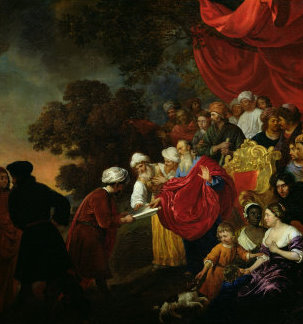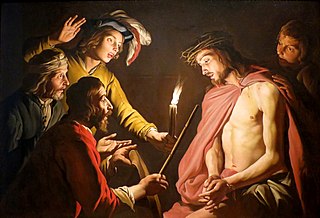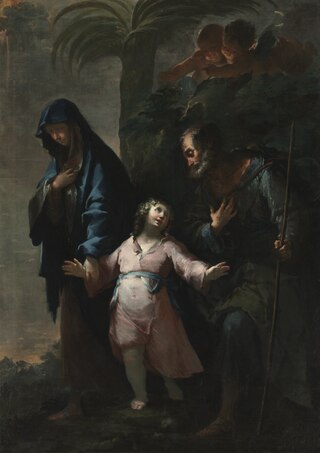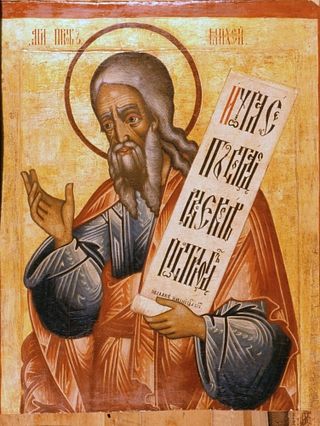Related Research Articles

Justin Martyr, also known as Justin the Philosopher, was an early Christian apologist and philosopher.

Michel de Nostredame, usually Latinised as Nostradamus, was a French astrologer, apothecary, physician, and reputed seer, who is best known for his book Les Prophéties, a collection of 942 poetic quatrains allegedly predicting future events.
The Second Coming is the Christian belief that Jesus will return to Earth after his ascension to heaven. The idea is based on messianic prophecies and is part of most Christian eschatologies. Other faiths have various interpretations of it.

According to the biblical narrative, Zerubbabel was a governor of the Achaemenid Empire's province of Yehud and the grandson of Jeconiah, penultimate king of Judah. Zerubbabel led the first group of Jews, numbering 42,360, who returned from the Babylonian captivity in the first year of Cyrus the Great, the king of the Achaemenid Empire. The date is generally thought to have been between 538 and 520 BC. Zerubbabel also laid the foundation of the Second Temple in Jerusalem soon after.

In religion, a prophecy is a message that has been communicated to a person by a supernatural entity. Prophecies are a feature of many cultures and belief systems and usually contain divine will or law, or preternatural knowledge, for example of future events. They can be revealed to the prophet in various ways depending on the religion and the story, such as visions, divination, or direct interaction with divine beings in physical form. Stories of prophetic deeds sometimes receive considerable attention and some have been known to survive for centuries through oral tradition or as religious texts.

Matthew Paris, also known as Matthew of Paris, was an English Benedictine monk, chronicler, artist in illuminated manuscripts, and cartographer who was based at St Albans Abbey in Hertfordshire, he authored a number of historical works, many of which he scribed and illuminated himself, typically in drawings partly coloured with watercolour washes, sometimes called "tinted drawings". Some were written in Latin, others in Anglo-Norman or French verse. He is sometimes confused with the nonexistent Matthew of Westminster.

The Passion is the short final period before the death of Jesus, described in the four canonical gospels. It is commemorated in Christianity every year during Holy Week.
A self-fulfilling prophecy is a prediction that comes true at least in part as a result of a person's belief or expectation that said prediction would come true. Self-fulfilling prophecies are an example of the more general phenomenon of positive feedback loops. A self-fulfilling prophecy can have either negative or positive outcomes. Merely applying a label to someone or something can affect the perception of the person/thing and create a self-fulfilling prophecy. Interpersonal communication plays a significant role in establishing these phenomena as well as impacting the labeling process.

The Flores Historiarum is the name of two different Latin chronicles by medieval English historians that were created in the 13th century, associated originally with the Abbey of St Albans.

Cadwaladr ap Cadwallon was king of Gwynedd in Wales from around 655 to 682 AD. Two devastating plagues happened during his reign, one in 664 and the other in 682; he himself was a victim of the second. Little else is known of his reign.
Sir John Maunsell, Provost of Beverley Minster, was a king's clerk and a judge. He served as chancellor to King Henry III and was England's first secretary of state.
Bec mac Dé was a legendary Irish prophet, known from saga literature surrounding the historical High King Diarmait mac Cerbaill and from the Irish Annals, where he is said to have died c. 553–7.

Matthew 2:23 is the twenty-third verse of the second chapter of the Gospel of Matthew in the New Testament. The young Jesus and the Holy Family have just returned from Egypt and in this verse are said to settle in Nazareth. This is the final verse of Matthew's infancy narrative.
Bible prophecy or biblical prophecy comprises the passages of the Bible that are claimed to reflect communications from God to humans through prophets. Christians usually consider the biblical prophets to have received revelations from God.
The Lady of Lawers was possibly a Scottish soothsayer from the late 17th century. Her existence is disputed due to a lack of corroborating information.
The books of the New Testament frequently cite Jewish scripture to support the claim of the Early Christians that Jesus was the promised Jewish Messiah. Scholars have observed that few of these citations are actual predictions in context; the majority of these quotations and references are taken from the prophetic Book of Isaiah, but they range over the entire corpus of Jewish writings.

According to the Hebrew Bible, Micah, also known as Micheas, was a prophet in Judaism and is the author of the Book of Micah. He is considered one of the Twelve Minor Prophets of the Hebrew Bible and was a contemporary of the prophets Isaiah, Amos and Hosea. Micah was from Moresheth-Gath, in southwest Judah. He prophesied during the reigns of kings Jotham, Ahaz, and Hezekiah of Judah.

Robert Walerand, was Justiciar to King Henry III (1216–1272). He was throughout his reign one of the king's familiares. Among the king's household knights he stands in the same position as his friend John Mansel among the royal clerks. Walerand was most notably employed by the king in the ill-fated scheme of raising money from the barons for his second son Edmund to take up the crown of Sicily, offered by the Pope in 1254. His forceful exactions in that connection were one of the causes of the rebellion of Simon de Montfort and the Barons' War, which ended however with royal victory at the Battle of Evesham in 1265. His principal residence was Siston, Gloucestershire.
Ben Drowned is a three-part multimedia alternate reality game (ARG) web serial and web series created by Alexander D. Hall under the pen name Jadusable. Originating as a creepypasta based on the 2000 action-adventure game The Legend of Zelda: Majora's Mask and published by Hall from 2010 to 2020 with a hiatus in-between, the series is known for creating many of the common tropes and themes of creepypasta that are used nowadays and for subverting themes from The Legend of Zelda series. The series concluded on October 31, 2020.

The mocking of Jesus occurred several times, after his trial and before his crucifixion according to the canonical gospels of the New Testament. It is considered part of the passion of Jesus.
References
- ↑ Matthew Paris, Chron. Majora, ii. 535, Rolls Ser.
- ↑ Paris, Chron. Majora, ii.541
- ↑ Paris, Chron. Majora, ii.547.
![]() This article incorporates text from a publication now in the public domain : "Wakefield, Peter of". Dictionary of National Biography . London: Smith, Elder & Co. 1885–1900.
This article incorporates text from a publication now in the public domain : "Wakefield, Peter of". Dictionary of National Biography . London: Smith, Elder & Co. 1885–1900.